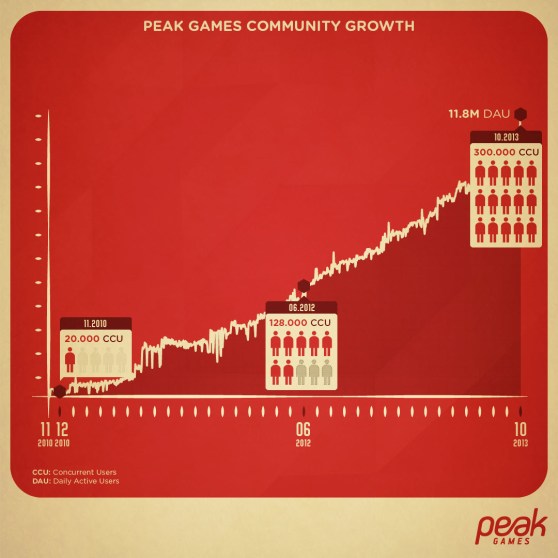While other digital game companies have had rocky growth, Turkey’s Peak Games has had a remarkable run in the past three years. The mobile, social, and online game publisher has more than 11.8 million daily active players, and it dominates the markets for such titles in Turkey, the Middle East, and North Africa.
That regional audience is so big that Peak Games has become one of the world’s biggest social-and-mobile game companies. Peak has done that by tailoring content to players in the Middle East, with titles such as Okey, an online version of a traditional board game that is popular in the region.
And while other social game companies like Zynga have faltered, Peak Games has made the leap into mobile and scored a hit with its mid-core, cross-platform title (or a hardcore game that can you can play in short mobile sessions), War Mercenaries. With these games, Peak is one of the new companies competing on a global stage with the likes of Electronic Arts, Disney, and King. War Mercenaries, for instance, has a following in the U.S., Western Europe, and East Asia.
“Three years ago, we said we were going to dominate this region. We are very much focused on the Turkish and Arabic regions because we believe there is a lot of untapped opportunity here with the hyper growth of mobile,” said Rina Onur, co-founder and chief strategy officer at Peak Games, in an interview with GamesBeat. “We started to invest in mobile not for short-term profit but because we knew it was the future. We began investing when there were only 2 million mobile devices in the region, and we had 10 million customers on Facebook. That strategy is paying off.”
The 300-percent sales growth per year is remarkable for a free-to-play gaming company that started in Nov., 2010. Peak Games now has 150 employees across multiple offices, and it has more than 25 million monthly active players.
Key to the firm’s growth is the Plus franchise, which are digital renditions of popular board, card, and tabletop games. People have played these games offline for generations, and the plus versions encourage multiple players to sit at virtual tables for long sessions with their friends. Six titles are available in the genre: Okey, Okey Plus, 101 Plus, Tavla Plus, Batak, and Pool Plus. The Okey Plus and 101 Plus titles are consistently in top-grossing lists, generating half their revenues from mobile.
“Our business is sustainable and profitable,” Onur said. “That’s a blessing these days. We were lucky in some sense. Not all mouse-clicking games translated well to mobile. But our multiplayer, synchronous titles (with simultaneous play) worked well on mobile. It’s like four people sitting at a table, playing cards or tiles.”
The Istanbul-based startup has more than 300,000 concurrent users, compared to 128,000 in June, 2012. It started with parlor games that are appropriate for the region. Now, it has expanded so that more than 50 percent of its revenue comes from mobile. The company focuses on community-driven multiplayer and synchronous releases. Peak Games tries to turn its offerings into staples of everyday life, and it services repeat players.
Peak started out on Facebook, but as that channel slowed, the developer began investing in mobile games about 18 months ago. Now, all of its flagship titles have launched on mobile. Apple’s iOS generated more revenue in the past, but Android has now surpassed iOS growth in terms of players. The iOS revenue metrics are better than Android. Facebook is still the largest platform, but mobile is growing rapidly.
“Now, we’re bringing our games out on iOS, Android, and Facebook simultaneously,” Onur said.
The company remains platform agnostic, and it has only just started to reach a global audience for its releases like War Mercenaries, which resembles Supercell’s Clash of Clans. The company plans to take War Mercenaries to mobile soon. Some of Peak’s games, such as Okey Plus, come embedded on the home screens of Middle Eastern wireless phone carriers.
“That is where the industry is going,” Onur said.
Peak Games will launch a series of new mobile and online titles in the fourth quarter. Over time, the company might move into other emerging markets. In-app purchases generate about 95 percent of revenue now, and ads account for 5 percent.
The startup has raised $30 million to date. The company’s investors include Earlybird Venture Capital, Hummingbird Ventures, and Endeavor Catalyst. For now, the developer can sustain itself and doesn’t need to raise money. But Onur said the firm might do some “acqui-hire” acquisitions, where it acquires companies to get more talent.
VentureBeat's mission is to be a digital town square for technical decision-makers to gain knowledge about transformative enterprise technology and transact. Learn More


